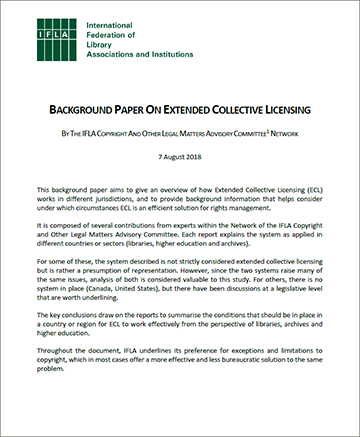Licensing as a solution to rights management? IFLA publishes extended collective licensing background paper
07 August 2018
Libraries have a mission to maximize access to their collections, for culture, education and research. In doing so, they face challenges around clearing rights – i.e. how to make these books, articles, photos or other material available to the public without infringing copyright.
Mass digitisation projects have brought this issue into focus, but it has long been a challenge, for example for universities or schools.
One emerging solution, at least in cases where copyright exceptions and limitations do not apply, is extended collective licensing. For many libraries around the world, this is a reality. But is it efficient or effective? Are there limits to what it offers, and what are the disadvantages? Are other countries ready for such a system?
Under extended collective licensing systems, collective management organisations are entitled to represent rightholders who are not their members. They can therefore issue licences and collect fees for use of their works and should then distribute royalties back to the original rightholder, minus administration costs.
For libraries, this offers an alternative to the complexity of trying to find owners for each individual work in a large collection. Especially in the case of orphan works or out of commerce works, this is particularly difficult. It is also relevant to archives, and to higher educational institutions, where mass use of educational material, often by students directly, is sometimes managed through such licenses.
However, as a license-based system, much depends on whether libraries can acquire the licences they need for their users, at a reasonable cost. Also, in contrast to unremunerated exceptions and limitations to copyright, extended collective licensing is more bureaucratic given the need to identify collecting societies and negotiate a deal. Authors and other creators who are not members of collecting societies may also have concerns.
As this solution for rights management seems to be gaining popularity, it is worth being aware of both its positive side and its limitations, and to draw on current experiences to inform further discussions.
The IFLA background paper on extended collective licensing presents examples of such systems under several jurisdictions. Reports from Canada, China, France, Germany, the United Kingdom, the United States, Norway and Sweden provide an overview the circumstances that appear to be needed for extended collective licensing to be an efficient solution.
It also identifies some suggested conclusions about the conditions required for extended collective licensing to be a realistic option. The paper should provide a useful advocacy tool in discussions around extended collective licensing.
Access the full report in pdf.
Contributors: Karolina Andersdotter, Jean Dryden, Shen Xiaojian, Zhang Ruobing, Liu Yuchu and Hao Jinmin, Sylvie Nérisson, Armin Talke, Benjamin White, Janice Pilch, Kristine Abelsnes and Inga-Lill Nilsson.